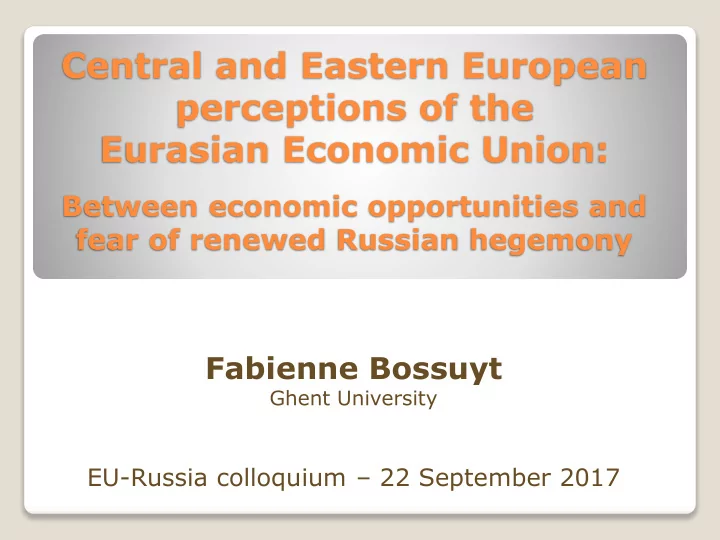

Central and Eastern European perceptions of the Eurasian Economic Union: Between economic opportunities and fear of renewed Russian hegemony Fabienne Bossuyt Ghent University EU-Russia colloquium – 22 September 2017
INTRODUCTION Q1: How do the CEECs Growing academic attention to Eurasian Economic Union, perceive the EAEU? incl. the implications and options for the EU Increased – yet still limited - academic interest in the CEE EU member states as foreign policy actors During Cold War, CEECs were under heavy economic Q2: What policy goals do they have influence of USSR (cf. ‘ satellites ’ under Soviet hegemony) concerning the EAEU? Members of the Soviet-dominated Comecon Q3: To what extent do they upload these Baltics were entirely under Soviet control goals onto EU level? <-> Very little is known about how the CEE member states view the EAEU
METHODOLOGY Data collection : Semi-structured interviews with officials from the o CEECs and the EU Statements/speeches by officials from the CEECs o Secondary sources: EU and national news sites o
FINDINGS Q1: Fear of renewed Russian hegemony vs. economic opportunities
Findings Q1: Perceptions of EAEU STRONG variation between the CEECs: EAEU as Russian attempt to restore Largely in line with CEECs ’ o Poland, Romania & Baltics are least regional hegemony attitudes and positions supportive of EAEU, and are very sceptical of towards Russia since Russia’s Russia’s political intentions annexation of Crimea o Slovakia & Czech Republic are sceptical of Cf. their positions on EU Russia’s political intentions, but would like sanctions on Russia economic cooperation with EAEU o Hungary & Bulgaria are most supportive of EAEU
Possible explanations: No single explanation, but combination of expla- natory factors: Historical reasons : Poland, Romania, Baltics • Historically difficult relationship with Russia (<-> Bulgaria) • Commercial interests are overshadowed Economic & energy dependence : Bulgaria, Czech Republic, Slovakia, Hungary • Commercial interests are prioritized (Non-economic) pragmatism : Hungary • Orban’s anti-democratic course
22% of Bulgarians want to join ‘ Eurasian Union’ EurActiv.com, 15 May 2014
Findings Q2 (goals) & Q3 (EU): Poland, Baltics & Romania : No rapproche- ment as long as Russia does not fulfil Minsk agreements - Poland and Lithuania active at EU level Hungary (& Bulgaria) : want closer cooperation with EAEU - Hungary active at EU level Slovakia & Czech Republic : follow EU position but business contacts with EAEU - Mostly inactive at EU level
Andreichenko: “Belarus ready to be a gateway for Slovakia to Eurasian Economic Union” 05.05.2016 - eng.belta.by
Thank you for your attention!
Recommend
More recommend